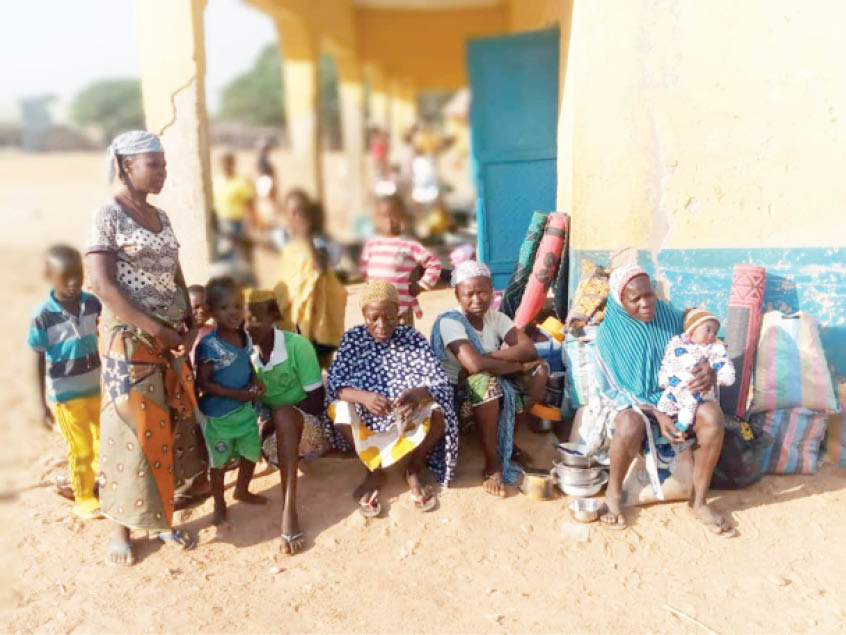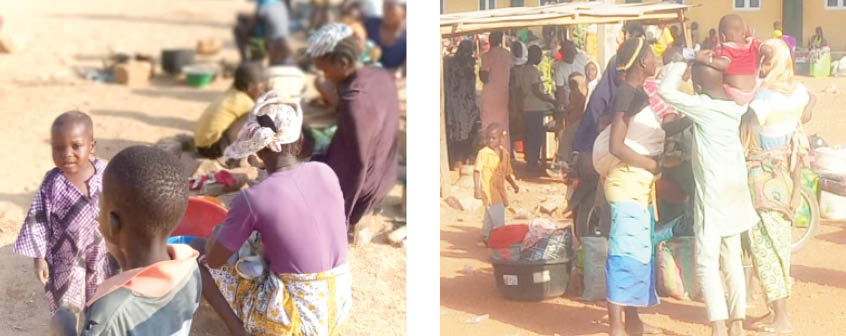Residents of security-challenged areas brace up for elections
Ahead of today’s presidential and National Assembly elections, some residents of security challenged areas have voiced out their minds on participating in the electoral process. While some have expressed determination to come out and exercise their franchise, others who have been forced out of their homes due to security challenges are worried that they would […]

FILE PHOTO: IDPs
Ahead of today’s presidential and National Assembly elections, some residents of security challenged areas have voiced out their minds on participating in the electoral process. While some have expressed determination to come out and exercise their franchise, others who have been forced out of their homes due to security challenges are worried that they would be denied the opportunity to cast their votes.
Mohammed Ibrahim Yaba (Kaduna), Tijjani Ibrahim (Katsina), Hope Abah Emmanuel (Makurdi) & Abubakar Akote (Minna)
Kaduna: Residents upbeat on voting
In Kaduna, residents of some of the areas with security challenges have expressed optimism to cast their votes during the presidential and National Assembly election scheduled for today.
Most of them who spoke yesterday said they would go out to vote for candidates of their choice even though they expressed concern over the security challenges facing their communities.
Retired perm-secs ask candidates to accept election outcomes
E/Guinea lauds firm as Otakikpo oilfield hits 11,000 barrels
Some of the villagers interviewed were from Randagi village in Birnin Gwari LGA, Rahiya village in Giwa LGA and Kuriga village of Chikun LGA.
One of the villagers from Kuriga town in Chikun, Ishaq Uwais, told Daily Trust Saturday that he will vote on election day because the polling unit is situated inside Kuriga town.
“We are faced with security challenges in the area but because the polling unit is located within the main town, I think it will be safe to vote on Saturday. My major concern is that we don’t have a strong internet network in this area and I heard the electoral machine uses internet network,” he said.
He also urged the security agencies to provide adequate personnel in rural areas on election day for the safety of the voters.
Also, a resident of Giwa LGA, Ridwan Rahiya, told Daily Trust Saturday that security has greatly improved in the area which gave them hope that election will hold in the area.
Another resident of Randagi village in Birnin Gwari, Shehu Muktar, said there are villages whose residents have been displaced following attacks, adding that they now reside at official IDPs centres in nearby villages.
He listed the surrounding villages to include Ukuka ward, Marabar Kigana village, and Hishirya village.
“But INEC only mentioned a polling unit as the only place in Birnin Gwari LGA where the election will not hold due to security reasons but the above villages listed are within Randagi ward and the villagers have all been displaced and living in Randagi town.

“So, based on our local arrangement, the people from these affected villages will be assembled somewhere safe to cast their votes instead of taking the electoral materials to those prone communities,” he said.
He explained that as community leaders, they decided to allow the displaced people cast their votes like other citizens in the country.
Similarly, Chairman of Birnin Gwari Emirate Progressive Union (BEPU), Ishaq Usman Kasai, in a statement, issued recently, said the security challenges in the LGA, if measures are not proactively taken, will hinder the election process in the area.
He said due to security problems, INEC has already cancelled one PU in Gayam Ward of the LG, adding that the cancelled PU is among the 240 PUs recently cancelled by INEC across Nigeria due to high-security threats.
“Our major concern is for our people, including the internally displaced persons (IDPs), to be allowed to exercise their franchise at their respective secondary locations by voting their choices in the election without any fear or intimidation,” he said.
Benue: Eligible voters may be disenfranchised
In Benue State, many eligible voters from security-prone areas who have been displaced following attacks would not be performing their civic responsibility during the general elections because they have no Permanent Voter Cards (PVCs).
Ibaah Jacob, an IDP at the Agagbe Camp, told our correspondent that though many of them already have PVCs and ready to vote, there were others who will not be able to vote.
He said, “There are some amongst us who even though were registered here at the camp could not get there PVCs.”
Jacob added in the past three days, more people had been displaced from security-challenged areas and flooded the camp as well.
“So, they won’t be able to vote too since their polling units are no go areas. The number keeps increasing on daily basis,” he said.
Meanwhile, the Benue State Emergency Management Agency (SEMA) has faulted the Independent National Electoral Commission (INEC) for not making available PVCs to all the internally displaced registered voters in the state.
SEMA’s Executive Secretary, Dr Emmanuel Shior, said almost all the eligible IDPs were registered but not all of them received their PVCs to participate in the election holding.
Shior, who made the observation while answering questions from journalists in Makurdi during the routine monthly distribution of relief materials to the IDPs in the state, worried that many of them would be disenfranchised.
But, the INEC Public Relations Officer in Benue, Terkaa Andyar, responding to the allegation, told journalists in Makurdi that the SEMA boss’ observation was borne out of ignorance because the fault was actually that of the affected IDPs who couldn’t avail the commission with correct information.
“Everybody is entitled to their opinions. We have records of IDPs. The phenomenon of IDPs is not restricted to Benue alone. There is a national policy of IDPs voting and this will be adopted in Benue. So, Benue INEC will not do anything different or outside the policy.
“By the fact that someone is displaced from his original abode makes him vulnerable. The commission went round to capture all IDPs who had voter’s card. The commission profiled them in such a way that it was possible that the cards can be printed for them.
“Unfortunately, most of them are rural dwellers. The information we harvested was not good enough to print cards for them. The fault was not from the Commission but from them (IDPs) as they could not give sufficient information to enable us print cards for them,” he said.
Katsina: INEC makes alternative arrangement for voting
In Katsina, there are mixed reactions from the people affected by insecurity with regards to the forthcoming elections.
While some have lost confidence in the process, others have welcomed the electoral empire’s decision to relocate their polling units to other safer places.
There are at least 12 local government areas considered as frontline LGAs which are most affected by the problem of banditry in the state.
Although, the security situation has improved tremendously in these areas lately, there are still some remote locations on the fringes of the dreaded forest areas where the bandits are hiding.
These LGAs include Jibia, Batsari, Safana, Danmusa, Sabuwa, Faskari, Kurfi, Dusinma, Kankara, Bakori, Dandume and Funtua.
INEC, however, said it had concluded arrangements to ensure that all eligible voters were given the opportunity to exercise their franchise by relocating polling units from the insecurity prone areas to safer places.
Head of voter education in the Katsina State office of INEC, Shehu Shuaibu, said the list of the affected polling units had already been pasted at INEC offices of the affected local government areas for all affected persons to go and check where they were relocated to.
Rahama Muniya, a displaced person from Batsari Local Government Area, currently taking refuge in Katsina metropolis, expressed lack of confidence in politicians, saying their houses were burnt and they would not go back to their communities ravaged by bandits.
She said majority of those they camped together with had lost their PVCs and were not able to get new ones due to the problems they were bedevilled with.
On his part, Hassan Dogon-faci, from Batsari—one of the affected areas, expressed satisfaction with the INEC’s arrangement of relocating their polling unit to a safer place.
“This is our opportunity to be able to cast our votes. Honestly, if it were to take place in our areas, many will not take part for fear of bandits’ attack. Nevertheless, adequate security measures need to be taken because some could be intercepted by the criminals on their way to cast their votes or while going back home after the election,” he said.
On their part, the security agencies have given assurance of adequate preparation to secure the lives of voters before, during and after the election.
Niger: Lack of cash, our major constraints
In Niger State, residents of security-challenged areas have expressed readiness to participate in the presidential and National Assembly as well as governorship and state assembly elections.
Our correspondent who interacted with some of them who are at IDPs camps in Minna, the state capital and those in Zumba, Shiroro Local Government Area, however said that lack of cash would constitute the major constraint to voting as some of them said the voting locations required them to travel.
One of residents, Farouk Jibrin, told our correspondent that some of the IDPs in Zumba who were to cast their votes in Galadima-Kogo, ward headquarters would not be able to go because of cost of transport.
“To move from Zumba to Galadima-Kogo would cost one not less than N1, 000 and most people are just struggling to feed in the camp. So, some people might participate but not all,” he said.
Resident Electoral Commissioner of INEC in Niger State, Alhaji Ahmad Yushau Garki, has said that elections would not hold in 10 polling units in Kontagora, Magama and Mashegu LGAs of the state due to the activities of bandits who had completely forced people out of communities in the area.
Also speaking, the Head of Department, Operations, in the commission, Mohammed Babatunde Yusuf, said the internally displaced persons from 248 polling units affected by security challenges would have their votes cast at the IDP voting centres in line with the INEC’s IDP voting policy.
